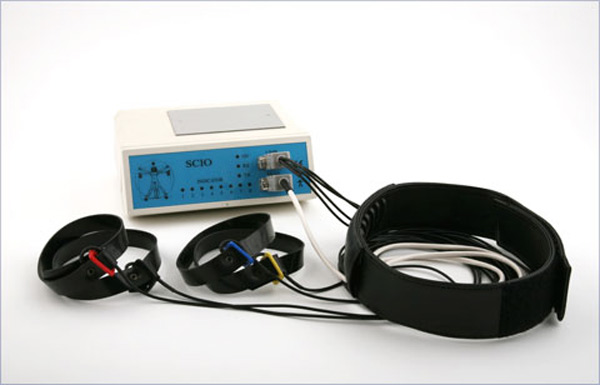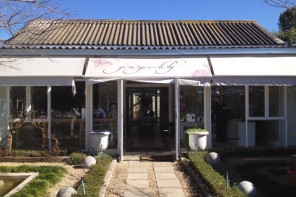When you start to talk about “energy medicine”, people raise their eyebrows – holding crystals and burning incense comes to mind. Carte Blanche’s recent coverage of the bogus DiaScan machine (and the dodgy consultants who are passing themselves off as medical experts) also cast a new light on the profession.
Quite a few people I know have been for SCIO body scans and they were raving about the insights it gave them about vitamin deficiencies and other aspects of their body. I decided to investigate for myself and booked a scan at Synergy Worx in Menlo Park, Pretoria.
“SCIO stands for Scientific Consciousness Interface Operation system and it’s a biofeedback technology,” says Marie-Louise, owner of Synergy Worx (she’s also a chiropractor and a musician).
It’s based on the principle that all the healthy organs in your body operate at a specific frequency. The scan is non-invasive and it will highlight any potential risk factors and recommend the appropriate homeopathic cures.
The SCIO is registered with South Africa’s department of health (and you’ll see a little Department of Health sticker and registration number on the practitioner’s machine). The scan costs in the region of R300 – R500 depending on where you go and this might even be covered by medial aids sometime in the future.
“The SCIO machine can show that your heart, your liver or any other organ is under stress, but patients should always be advised to go a cardiologist or other specialist if something gets picked up during the session. If the SCIO shows your heart is under stress, this doesn’t mean it’s the beginning of the end – it’s just something that you should take note of and get checked out if you’re having any other symptoms or problems,” says Marie-Louise.
One of the reasons why people are skeptical of this type of diagnosis is because there are a lot of false claims on the internet. Biofeedback doesn’t set out to replace a traditional doctor’s check-up and it doesn’t miraculously cure diseases.
“The problem with energy medicine is that there isn’t a governing body and there aren’t rules or regulations that people need to adhere to,” says Marie-Louise. “There also isn’t a standardized course that people need to complete in order to become a practitioner – this makes it too easy for people to get scammed and it isn’t doing the industry any favours. I would like to see a regulating body in South Africa for SCIO in the future,” says Marie-Loiuse.
While a scan will show you which parts of your body are under stress, it can’t diagnose cancer or predict a heart attack. Some people don’t even come for the full body scan, they just want to have their heart’s checked, for example.
Some websites claim that the scan takes “less than five minutes” – it’s actually a 45 minute process. You lie down and the device is connected to your body in five places – one light contraption around your head and a rubber strap around each arm and leg.
Within five minutes, the results start coming up on the practitioner’s computer screen. It’s a systematic process where your overall health is checked first (you get a score out of 10 for your overall health). Your risk profiles will be highlighted and you will be able to see what types of vitamins and minerals your body is lacking. A cool thing about the SCIO scan is that a lot of the results correlate with one another. For example, my results showed that I had elevated stress levels and my vitamin results showed that my vitamin B levels were very low (your body has increased requirements for vitamin B during periods of stress).
The vitamin and mineral suggestions taught me a bit more about tissue salts as well. It often happens that people start taking calcium supplements, for example, but they don’t have the right phosphate levels to metabolise the added calcium. Tissue salts are great for this because they have the right blends of minerals. It’s also cheap (R30 a bottle at Dischem).
“I would be weary of people who sell medicines directly after doing a SCIO scan,” warms Marie-Louise, who doesn’t sell vitamins, minerals or medicine – she leaves you with a copy of the results and will point you in the right direction if you need to see a medical expert or simply need a B12 injection. “Not every SCIO practitioner is out to scam you, but selling vitamins and medicines as ‘extras’ after a scan could cloud a person’s judgments,” says Marie-Louise.
The part where the SCIO scan gets a bit odd (for me anyway) is at the end where the machine gives a “psych suggestion”. This is just a random one or two sentence piece of advice that aims to improve your mental well-being. My psych suggestions were “Take life more lightly” and “play a little each day”. These suggestions might’ve come up because my stress levels were a bit high.
The final part of the process shows you what your aura looks like. It actually comes up on the screen and you can either be surrounded by a single coloured cloud or a multiple layers. My scan showed multiple colours. Firstly I was surrounded by purple, which meant that I’m in a new phase of my life. Further away was a green cloud, which means love and growth and further from this was blue, which means that I’m in a creative and problem-solving state of mind.
Whether you’re into energy medicine, homeopathic cures or completely opposed to it – seeing which vitamins and minerals your body needs (or being notified about possible high cholesterol or heart problems) can make a difference to the way you eat, live and take care of your body.
*Get more information about the benefits of SCIO or book a scan by contacting synergyworx@gmail.com









